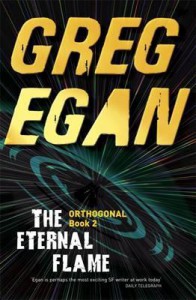The Eternal Flame - Greg Egan

In the sequel to The Clockwork Rocket (one of my favourite books of the year, because women doing science), the Peerless is already several generations into space. There's a population crisis going on: women starve themselves in the hope of only having two children (instead of the usual four). Carlo, a biologist, is busy looking at ways of reducing fertility, and his findings threaten to shake the very foundations of the culture his people have built aboard the flying mountain; while his co Carla, a physicist, looks for the elusive Eternal Flame, the technology which will allow the Peerless to return to the home world and rescue everyone from the threat of the Hurtlers.
There's still a lot of physics in this book. I still didn't understand any of it.
As to the feminist undertones: I don't think they're anything like as striking and as, perhaps, revolutionary as they were in Rocket. I feel like in the first book we saw a group of women supporting each other and defiantly doing science despite what everyone thought of them. And that was empowering and wonderful, especially in a genre (hard SF) which is generally dominated by maleness.
But the surprise has worn off in Flame. The fact that sex and death are the same for women in Egan's universe was in Rocket an immediate and striking way of reframing what feminism means, but it's a blunt tool to build a trilogy on. Though there are scenes in Flame which made me viscerally angry, I don't feel like it's anger directed anywhere. Aboard the Peerless, women are allowed to be scientists and councillors and engineers, as they weren't on the home world, so the same kind of visceral anger doesn't feel like an appropriate response any more: it needs to be more nuanced, more political, less obviously weighted.
That said, Flame's ending was as perfect for the book it finished as Rocket's was, rather neatly avoiding the trap of needing men to save women (and thereby make their choices for them). It's not about men; it's about what women want and women need. There's certainly nothing objectionable about Egan's brand of feminism, and indeed there's much to be lauded about it. It simply loses its way a little, here.
 1
1
 2
2


